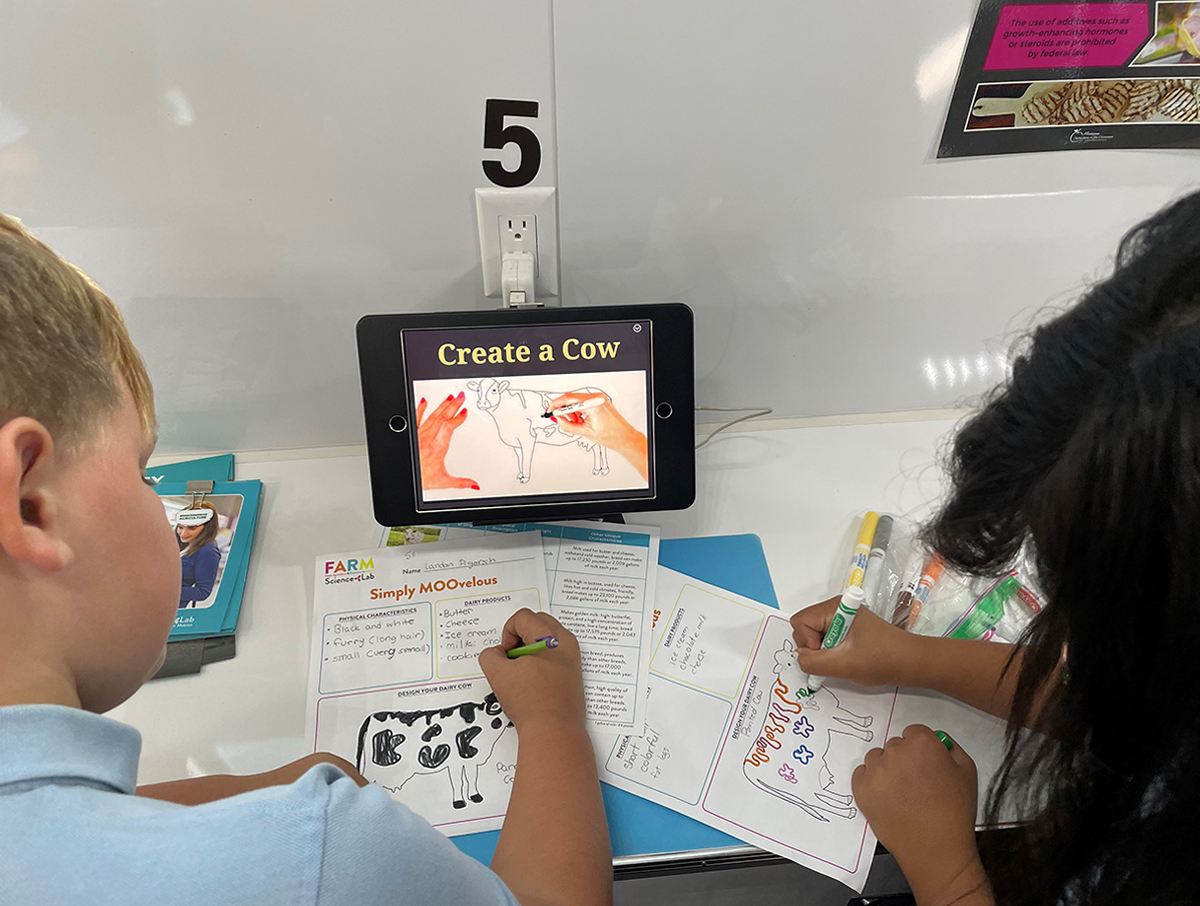FARM Science Van Lessons
Lesson Objectives
Each FARM Science Van lesson is taught with the purpose of educating students about agriculture while using science-based methods. There are three main objectives in each lesson:
- A hands-on science experience in each of the lessons taught in the FARM Science Van.
- Exploration of science and agriculture related careers
- Discovery of agriculture's importance to students' daily lives
Lower Elementary Lessons (Grades K-2)
Click on each lesson title for a full outline of student learning objectives and educational standards.

Build – A – Farm
- Grade Recommendation: K-2
- Duration: 30 minutes
- Through a photo matching activity, students will make connections between items raised on a farm and products used in their daily lives. Students will build their own mini-farm, exploring the ways a farmer provides for the needs of plants and animals, including food, water, and shelter.
- NGSS: K-ESS3-1, K-ESS3-3, K-PS3-2, 1-LS3-1, 2-LS4-1, 2-PS1-1, 2-PS1-2
Crawly Critters
- Grade Recommendation: K-2
- Duration: 30 minutes
- Students will learn how to identify if a living thing is an insect or not. They will learn about how insects can be harmful or helpful on a farm. Students will learn how insects communicate and participate in a communication activity. Finally, students will create their own insect.
- NGSS: 1-LS1-1, LS1.A, LS1.D
Forestry
- Grade Recommendation K-2
- Duration: 30 minutes
- Forestry plays a large role in Michigan agriculture. Students will learn about the needs of trees, the benefits to their environment, and what products come from trees. At the end of the lesson, students will make a forest bracelet to represent the benefits of forestry!
- NGSS: K-ESS2-2, K-ESS3-1, K-ESS3-3
Upper Elementary Lessons (Grades 3-5)

Click on each lesson title for a full outline of student learning objectives and educational standards.
Erosion
- Grade Recommendation: 3-5
- Duration: 50 minutes
- Students will explore an introduction to the Earth's land and water use. Do you know what percentage of the Earth is water and what percentages of the Earth land is usable for agriculture? Students will also learn about how farmers work with agronomists and hydrologists to ensure soil health and water quality are safe not only for the fields and farms, but their local watershed! From here, students will work in teams to build a watershed and see the impact water has within their local watershed. Students will demonstrate water flow through a watershed, identifying landforms and sources of erosion. Finally, students will write a hypothesis about what type of soil is best for agriculture and fighting erosion. Students will demonstrate water flow through three types of land, including a grassy field, rocky field, and a field with mulch. Students will continue the exploration using sand and water to simulate erosion to test their hypothesis.
- NGSS: ESS3.C, 4-ESS2-1, 5-ESS3-1
Power of the Potato
- Grade Recommendation: 3-5
- Duration: 50 minutes
- Hot potato! Students will explore the potato harvesting process from seed to fork and the nutritional values of potatoes and how that fits into their daily diet. In the end, students will be asked to investigate how certain potato products are packaged into the delicious foods we eat.
- NGSS: 3-5-ETS1-2, 4-LS1-1, T3.3-5 a, T3.3-5 b, T3.3-5 e
Simply MOOvelous!
- Grade Recommendation: 3-5
- Duration: 50 minutes
- Students will be working together to learn about five common dairy breeds in Michigan. They will learn about breed origins, physical traits and other unique characteristics. Students will learn about the dairy process from cow to container and a variety of products that contain dairy. In conclusion, students will be given an opportunity to create their own dairy cow based off the traits that are related to their favorite type of dairy product.
- NGSS: 3-LS3-1, 3-LS3-2, LS1.C
